Congratulations! on taking this important step towards your interest in Making A Positive Change In Your Life!
Starting an Urban Garden, filled with a variety of produce can be both fulfilling and challenging. there is so much to learn and at the same time, earn.
As an advocate for self-sufficiency, I have committed myself to enhance the life’s of others—youth at risk, the under-educated, and those is crisis by providing valuable and empowering services, resources and opportunities through educational programs and employment venues at the Mathis Community Center, in Detroit, Michigan.
This Urban Gardening tutorial is the first of many income opportunities that I plan to offer and give my ‘stamp of approval’ on as being a worthwhile and profitable self-sufficiency income initiative that is among the most affordable and obtainable, that ensures sustainability.
So, if you’re interested in starting an urban garden of your own, to have a profitable and rewarding business, continue reading the step-by-step guide below for more detailed information on how to safely grow and operate your own urban garden. There are lots of useful resources and supportive networks available for both first-time planters and seasoned harvesters.
Happy Planting!

Judge Mathis has gained national success with his hit television show
“The Judge Mathis Show”, which has been on the air for the last 25 years
Overview: Now is the time to put yourself in the center of this growing movement.
Have you found yourself admiring the various community gardens and urban gardens in your neighborhood, and felt confident that you, too, could create an appealing food garden to be marveled at? The prospect of starting one is not as daunting as you may think. Without question the rewards of creating and maintaining a successful urban garden from the ground up (literally) is well worth the effort. The pride you’ll feel is practically incomparable.
Urban gardening has become increasingly popular in the 21st century, with the number of Americans growing food in local communities– rising by 200% between 2008 and 2016. When maintained with care and commitment, urban gardening is one of the most appreciated, and needed endeavors within local communities. People in the neighborhoods benefit when your produce is made available, while also providing a profitable business enterprise for YOU!
So, if you are feeling inspired, have an appreciation for hard work, and the willingness to do what it takes to succeed, then this is the business for you! Now, let’s get started!

GETTING STARTED:
Do I need a license to sell my produce? How do I get a license to sell my produce?
Across the country, there are many agencies, gardening organizations and resources that exist to promote the independence of owning and operating a for-profit urban garden within the local communities.
As well, there are state agencies, local ordinances and regulations that support the transformation of turning vacant and abandon lots into beautiful and purposeful urban gardens. However, you may have to contact your local city government officials for specific authorization.
Depending on the state in which you live, will determine whether or not sales of foods such as fresh produce [require a license; and what kind of license is necessary.
It is important to know if you are growing organic produce or using traditional (non-GMO) seeding and/or transplants. Organic farming is labor intensive. Although you may not need a license to sell fruits and vegetables grown organically, you do need to meet USDA standards for organic labeling

Urban Farming Is Totally Within The Realm Of Possibility!
8 Steps To Start An Urban Garden
It’s easier than what you may think!
1. CHOOSING AN APPROPRIATE SITE
Across the country, urban gardens are becoming an anchor for neighborhood revitalization. These gardens range in purpose from increasing access to fresh, healthy food in urban towns; to creating a profitable livelihood for yourself and family.
Once you identify an ideal site (unless you’re using your own private property), find out who owns the land. You will of course need to have permission from the landowner which may include obtaining permission through a written agreement or lease, and share your plan of action for his property. You will need to contact the city’s licensing department to learn more, and in some cases, obtain liability insurance.
When growing produce, it’s best to find a location that receives adequate exposure to direct sunlight (at least six hours per day); and it’s a MUST that you make provision for adequate water supply.
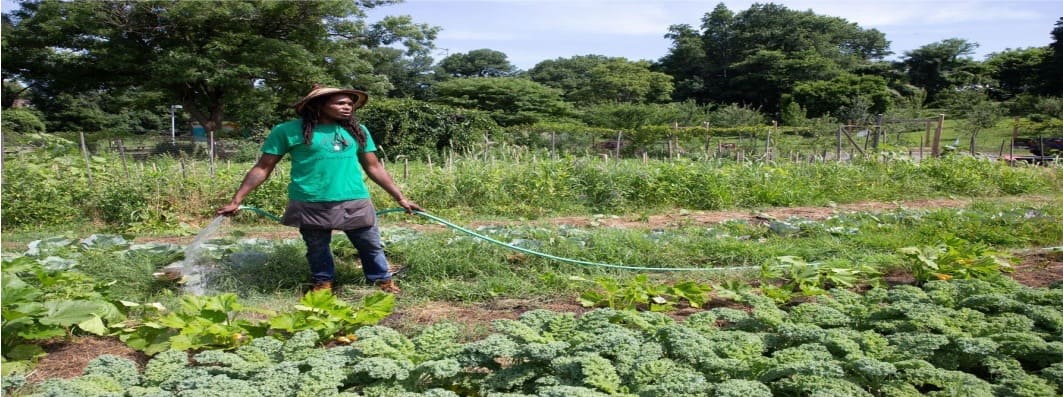
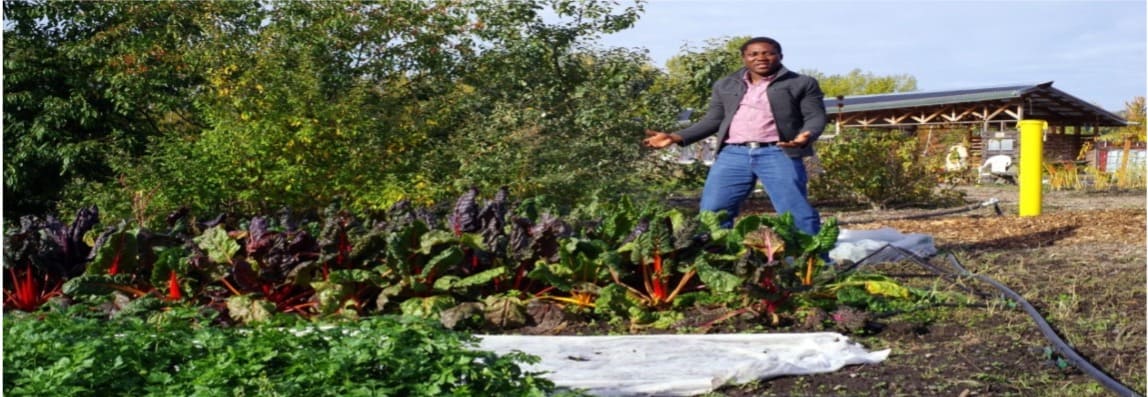
2. Receive Resources from Local Agencies and Gardening Organizations
Most municipalities have some sort of urban garden information resource in place, so the first thing you should do is search for such information online as it directly relates to your city or town. Secondly,. registering with a local gardening organization is to your advantage. You can apply for an annual membership, which prove to be beneficial . Many supply you with FREE seeds, transfers, soil, training and technical support. All necessary MUST-HAVES when creating a successful urban garden.
Forming local partnerships, as well, is an excellent way to leverage resources and gain access to needed materials, tools, funding, volunteers, and technical assistance.
USDA’s People’s Garden website
has how-to videos and databases filled with garden-based learning curricula, free seed and funding sources, and healthy gardening practices. The long-term success of your urban garden will depend a great deal on YOU, and your dedication given on a daily basis.
It is to your advantage to contact local businesses and organizations to see if they are willing to provide support in ways that can include financial endowments, materials used to build the agricultural site, and seeds for planting. Sponsors can be local credit unions, retailers, churches, schools, home & garden suppliers, grocery stores or any others that comes to mind. In addition to the essentials a good sponsor can serve to add special touches to your urban garden such as ornate benches to relax in contemplation after a hard day of working in the soil.
Utilizing all of your city ‘s support, and reference material from governing bodies and supportive organizations you will be well prepared to cultivate and harvest a healthy growth of produce for profit.
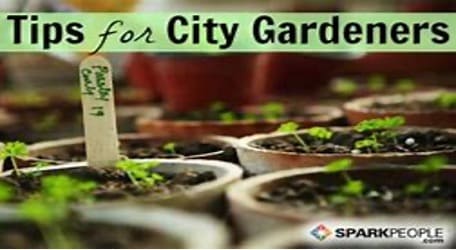

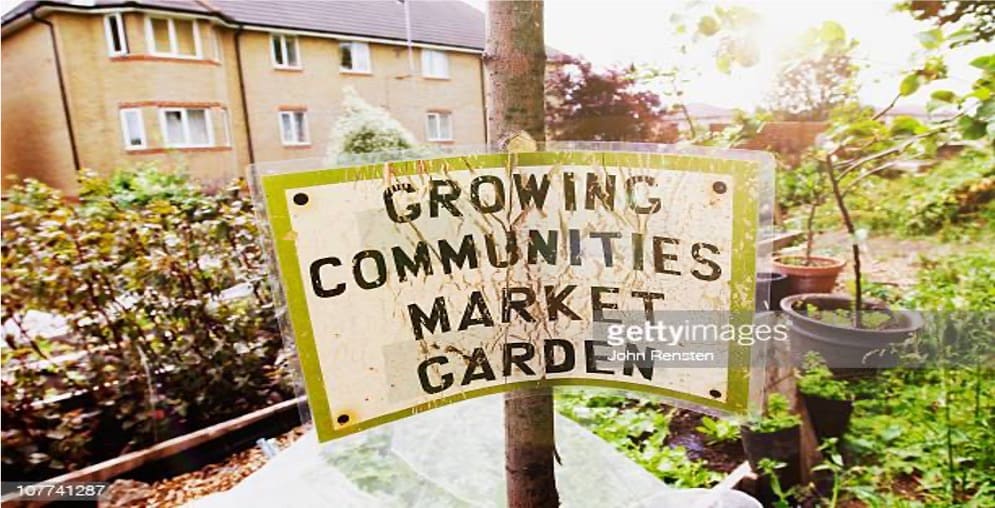
3. Conduct A Soil Sample
A soil test is important to the growth and nutrients of the produce. Before you start planting, it is important to research the history and past uses of your chosen site.
While EPA has step-by-step guidelines on how to do this, your local gardening organizations has qualified individuals that will come out to your garden location and test the soil.
According to many gardening organizations it’s best to fill the beds with a 50/50 compost top soil mix.
Take into consideration that the quality of the soil can have an effect on the quality of growth and nutrient of your produce, possibly negatively affecting the ability to sell your produce.
(Include Slide 7 – Picture 1 at the bottom of this text)

4. Create A Plan of Action – (Sample Page)
This is a step-by-step guideline and checklist on activities ‘to do’ throughout the process of maintaining your urban garden.
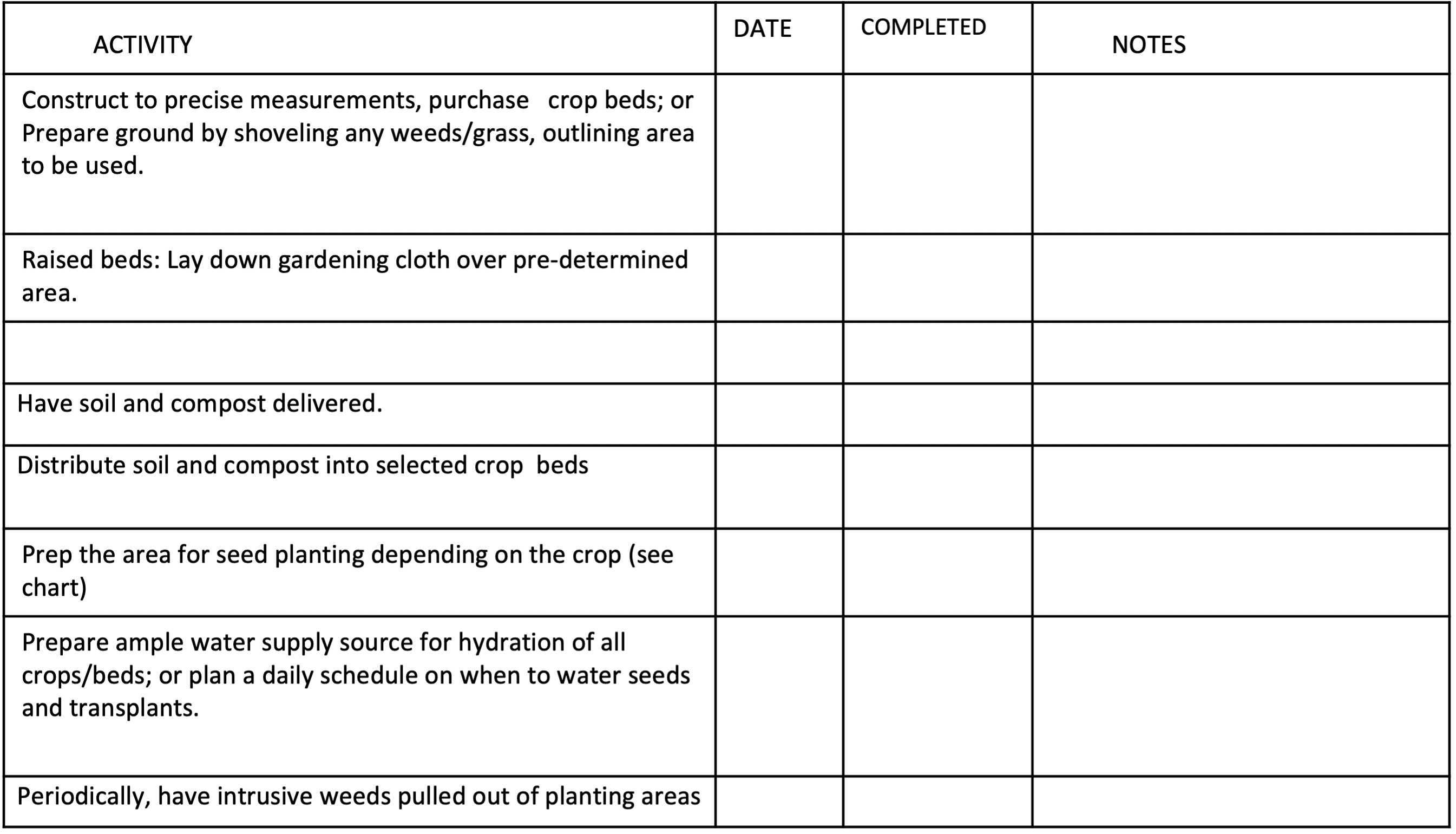

5. Urban Garden Budget Projection
Sample
(Insert Slide 9 – Graph 1 on top. Of Graph 2)

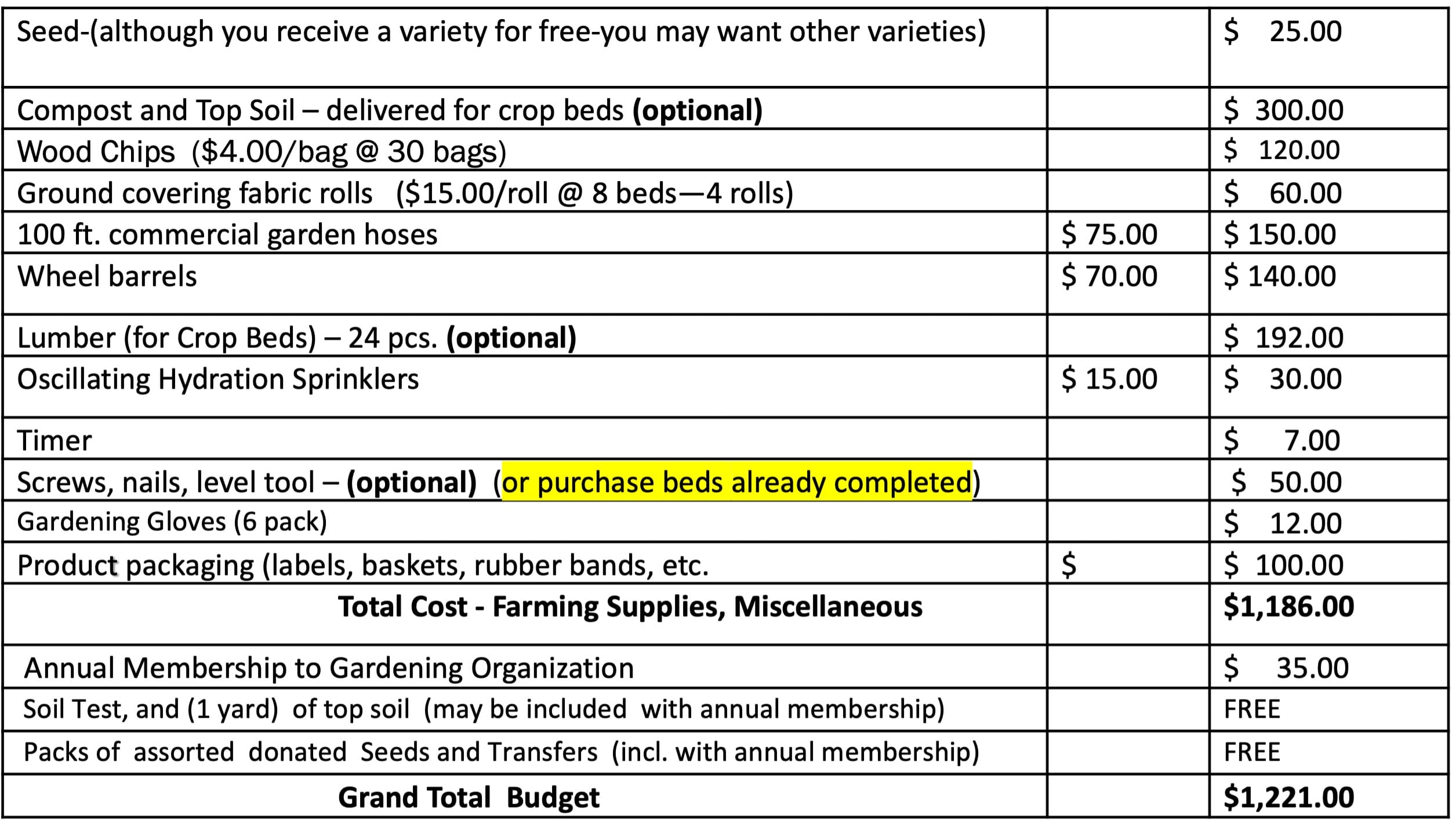
6. Select Style of Bedding: ‘Raised’ or ‘Ground’
If you’re starting an urban garden from scratch, you’ll need to make some basic arrangements before planting your first seed. You will need to decide on whether you prefer using raised beds, or in ground gardening. There’s certainly no right or wrong way to structure a garden.
Raised beds come in many various sizes and shapes. Whether you prefer to purchase the beds, wood or galvanized , or choose to build your raised beds using pre-treated wood, or you simply prefer in ground gardening plots, you should know that a well prepared raised bed allows the soil to drain better than an ‘in ground’ bed. However, the benefit to in ground gardening is that it’s much cheaper and it doesn’t require special materials for growing.
Depending on the number of crop beds you decide upon, you can either purchase bags of soil from your local garden center, or have the soil/compost delivered to your garden location from a supplier. There is a cost per yard, as well as a delivery charge. And it’s best to ask if they supply you with a tarp when dumping onto the surface.
Now it’s time to prepare the site for planting. Debris must be cleared, weeds need to be pulled, in ground plots may require leveling, and soil may need to be turned.

7. Maintain And Grow Your Urban Garden
It’s best to start small and grow food you believe you can sell. Once you get the hang of it, you could be producing a serious amount of produce.
With urban farming, there are two categories, Hi-Rotation (HR) and Bi-Rotation (BR). HR areas are plots with constant activity. In them, you should plant quick crops which mature in under 60 days. Allowing for continuous ‘turn over’ (growth) to generate from a single crop; which will benefit your gross revenue–meaning you will yield a greater amount of produce to sell.
Start gardening by working your urban garden plan. Once the project is up and running, you must stay on top of it. Over time, revisit the plan and make any needed changes based on lessons learned or feedback. Remember to plan ahead so that the garden will continue to grow for seasons to come.
The total amount of time you invest in maintaining and growing your garden should be logged daily.

8. Selling Your Garden Produce
Yes You Can make money from selling your garden produce!
Many states try to make selling urban garden produce as easy as possible without compromising public health and safety. Your state or county agricultural department should be able to provide you with guidance on selling produce from your garden.
State laws differ on whether you can sell to restaurants, local merchants, farmer’s markets; [from] your home or over the internet, and whether you require a light inspection or none at all.
Talk to your state or county agricultural department about what regulations apply to selling your produce to the various venues:
•Local farmer’s market. These markets are becoming increasingly popular venues to sell fresh fruit and vegetables from. To sell at a farmers market, you have to apply for state certification. The application requires identifying where you grow your food and identifying the food you intend to sell. Your property may have to undergo a state inspection. If you’re growing food in agriculturally zoned, unincorporated areas, you can legally set up a farm stand. If it’s temporary or smaller than 120 square feet, you don’t need a building permit. For some states you don’t need a permit to sell produce at a farmers market, but if you hand out samples, you have to follow state sanitary requirements.

Selling Your Garden Produce (Cont’d)
•Local retailers, specialist restaurants and delis may be interested in your homegrown herbs, fruit and vegetables, provided you can promise a regular supply. If you sell to local retailers or restaurants, your town or county may require you to take out a business license.
•Selling from home. You can grow farm produce in most parts of the state without a state permit. Selling, however, may require paperwork, depending on how you’re connecting with your customers.
•Home Delivery. If you deliver your own produce to customers or have them pick it up from you, no license is needed to sell fruits and vegetables.
Within some states you can ship produce to customers without a permit as long
as you watch for quarantines banning shipments from pest-infected areas. If you
ship to other states, your state may want to inspect your shipments.

POTENTIAL FINANCIAL PROJECTION
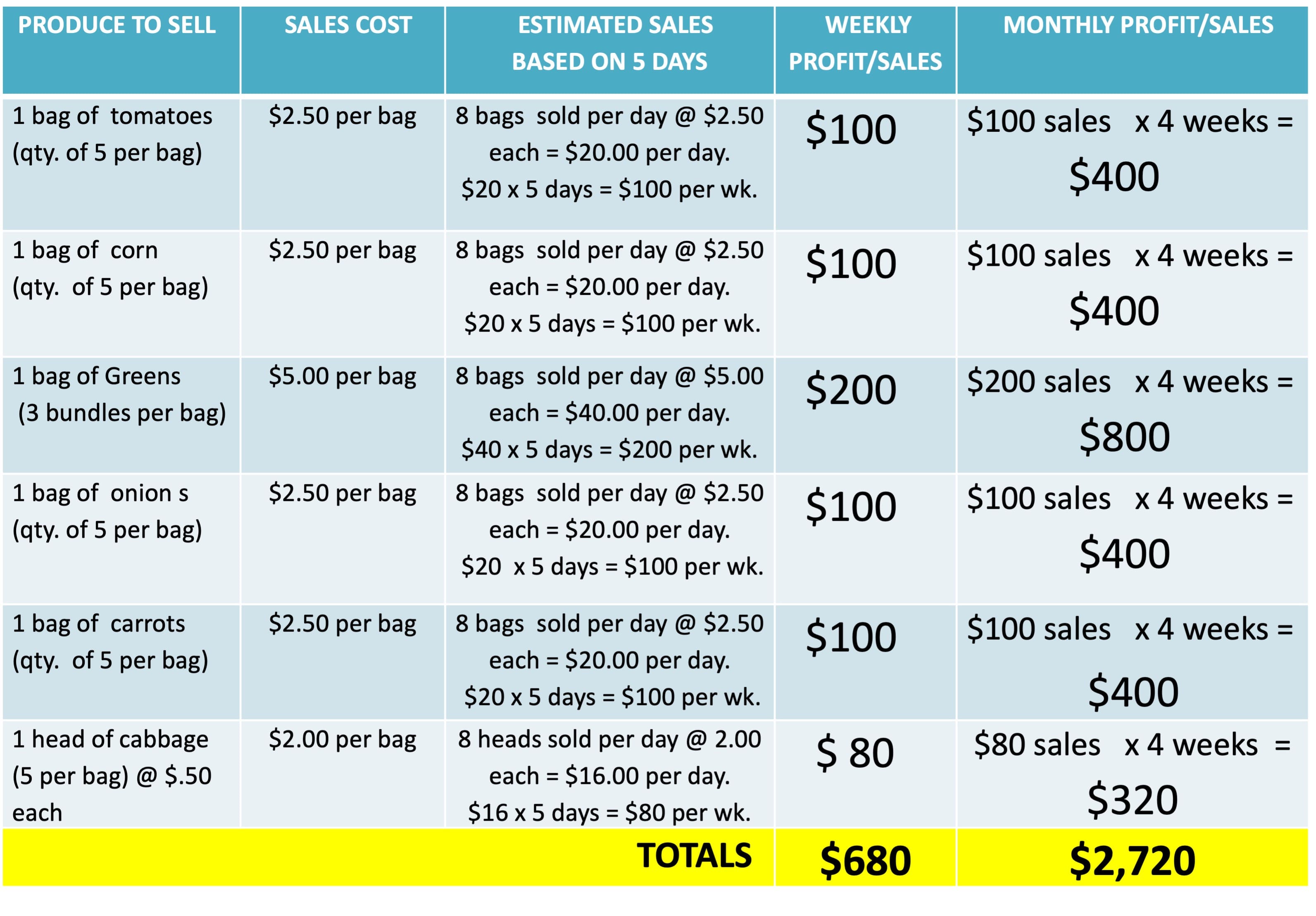
Slide 15
Resource Page
These resources can help you set up your business and make money. It can also create jobs for other people in your neighborhood.
Growing your own food doesn’t have to be hard, even if you live in the city. Urban gardening can help you grow your own fruits and vegetables in a sustainable way. All you need to do is take that first step.
Keep Growing Detroit.
https://www.
Urban Roots: Garden Leadership Training
This six-week comprehensive course provides participants with the skills and knowledge to successfully establish and/or maintain a thriving garden.
Gardening Laws And Ordinances – Common Garden Laws
https://www.gardeningknowhow.
Laws and Regulations that Apply to Your Agricultural Operation.
https://www.epa.gov/
What License If Any Do I Need Growing, Selling Vegetables
https://www.filingsusa.com/
Resource Page
How to sell and make money from garden and greenhouse produce
https://www.flowerpotman.com/
• PACA Licensing | Agricultural Marketing Service
https://www.ams.usda.gov/
• Common Questions & Answers | Agricultural Marketing …
https://www.ams.usda.gov/
• USDA APHIS | Fruits and Vegetables Permit Information
https://www.aphis.usda.gov/…
• Urban Farming | Grow Your Own Food – Food Unfolded
www.foodunfolded.com/article/
Slide 17
Resource Page
•What is Urban Gardening and Importance of Urban Gardening
https:/gardeningelsa.com/urban-gardening
https://www.usda.gov/
• Detroit’s Urban Farming and Urban Gardens
https://visitdetroit.com/
Learn about the retail food store license.
Agency: United States Department of Agriculture
Division: Fruits and Vegetables License











